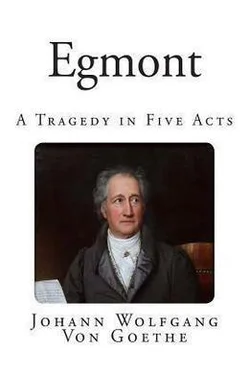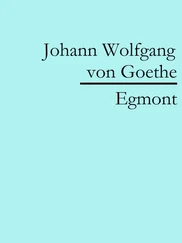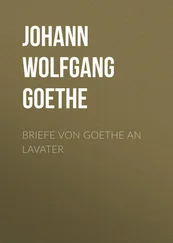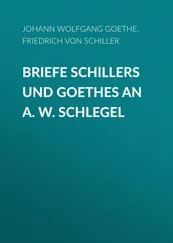Johann von Goethe - Egmont
Здесь есть возможность читать онлайн «Johann von Goethe - Egmont» весь текст электронной книги совершенно бесплатно (целиком полную версию без сокращений). В некоторых случаях можно слушать аудио, скачать через торрент в формате fb2 и присутствует краткое содержание. Год выпуска: 2015, Издательство: epubBooks Classics, Жанр: Драматургия, на английском языке. Описание произведения, (предисловие) а так же отзывы посетителей доступны на портале библиотеки ЛибКат.
- Название:Egmont
- Автор:
- Издательство:epubBooks Classics
- Жанр:
- Год:2015
- ISBN:нет данных
- Рейтинг книги:4 / 5. Голосов: 1
-
Избранное:Добавить в избранное
- Отзывы:
-
Ваша оценка:
- 80
- 1
- 2
- 3
- 4
- 5
Egmont: краткое содержание, описание и аннотация
Предлагаем к чтению аннотацию, описание, краткое содержание или предисловие (зависит от того, что написал сам автор книги «Egmont»). Если вы не нашли необходимую информацию о книге — напишите в комментариях, мы постараемся отыскать её.
Egmont — читать онлайн бесплатно полную книгу (весь текст) целиком
Ниже представлен текст книги, разбитый по страницам. Система сохранения места последней прочитанной страницы, позволяет с удобством читать онлайн бесплатно книгу «Egmont», без необходимости каждый раз заново искать на чём Вы остановились. Поставьте закладку, и сможете в любой момент перейти на страницу, на которой закончили чтение.
Интервал:
Закладка:
Alva (who has meanwhile again looked round). There is nothing more natural than that a king should choose to retain the power in his own hands, and that he should select as the instruments of his authority, those who best understand him, who desire to understand him, and who will unconditionally execute his will.
Egmont. And just as natural is it, that the burgher should prefer being governed by one born and reared in the same land, whose notions of right and wrong are in harmony with his own, and whom he can regard as his brother.
Alva. And yet the noble, methinks, has shared rather unequally with these brethren of his.
Egmont. That took place centuries ago, and is now submitted to without envy. But should new men, whose presence is not needed in the country, be sent, to enrich themselves a second time, at the cost of the nation; should the people see themselves exposed to their bold, unscrupulous rapacity, it would excite a ferment that would not soon be quelled.
Alva. You utter words to which I ought not to listen;—I, too, am a foreigner.
Egmont. That they are spoken in your presence is a sufficient proof that they have no reference to you.
Alva. Be that as it may, I would rather not hear them from you. The king sent me here in the hope that I should obtain the support of the nobles. The king wills, and will have his will obeyed. After profound deliberation, the king at length discerns what course will best promote the welfare of the people; matters cannot be permitted to go on as heretofore; it is the king's intention to limit their power for their own good; if necessary, to force upon them their salvation: to sacrifice the more dangerous burghers in order that the rest may find repose, and enjoy in peace the blessing of a wise government, This is his resolve; this I am commissioned to announce to the nobles; and in his name I require from them advice, not as to the course to be pursued—on that he is resolved—but as to the best means of carrying his purpose into effect.
Egmont. Your words, alas, justify the fears of the people, the universal fear! The king has then resolved as no sovereign ought to resolve. In order to govern his subjects more easily, he would crush, subvert, nay, ruthlessly destroy, their strength, their spirit, and their self–respect! He would violate the inmost core of their individuality, doubtless with the view of promoting their happiness. He would annihilate them, that they may assume a new, a different form. Oh! if his purpose be good, he is fatally misguided! It is not the king whom we resist;—we but place ourselves in the way of the monarch, who, unhappily, is about to take the first rash step in a wrong direction.
Alva. Such being your sentiments, it were a vain attempt for us to endeavour to agree. You must indeed think poorly of the king, and contemptibly of his counsellors, if you imagine that everything has not already been thought of and maturely weighed. I have no commission a second time to balance conflicting arguments. From the people I demand submission;—and from you, their leaders and princes, I demand counsel and support, as pledges of this unconditional duty.
Egmont. Demand our heads, and your object Is attained; to a noble soul it must be indifferent whether he stoop his neck to such a yoke, or lay it upon the block. I have spoken much to little purpose. I have agitated the air, but accomplished nothing.
[Enter Ferdinand.
Ferdinand. Pardon my intrusion. Here is a letter, the bearer of which urgently demands an answer.
Alva. Allow me to peruse its contents. (Steps aside.)
Ferdinand (to Egmont). 'Tis a noble steed that your people have brought, to carry you away.
Egmont. I have seen worse. I have had him some time; I think of parting with him. If he pleases you we shall probably soon agree as to the price.
Ferdinand. We will think about it.
(Alva motions to his son, who retires to the back–ground.)
Egmont. Farewell! Allow me to retire; for, by heaven, I know not what more I can say.
Alva. Fortunately for you, chance prevents you from making a fuller disclosure of your sentiments. You incautiously lay bare the recesses of your heart, and your own lips furnish evidence against you, more fatal than could be produced by your bitterest adversary.
Egmont. This reproach disturbs me not. I know my own heart; I know with what honest zeal I am devoted to the king; I know that my allegiance is more true than that of many who, in his service, seek only to serve themselves. I regret that our discussion should terminate so unsatisfactorily, and trust that in spite of our opposing views, the service of the king, our master, and the welfare of our country, may speedily unite us; another conference, the presence of the princes who to–day are absent, may, perchance, in a more propitious moment, accomplish what at present appears impossible. In this hope I take my leave.
Alva (who at the same time makes a sign to Ferdinand). Hold, Egmont!—Your sword!–(The centre door opens and discloses the gallery, which is occupied with guards, who remain motionless.)
Egmont (after a pause of astonishment). This was the intention? For this thou hast summoned me? (Grasping his sword as if to defend himself.) Am I then weaponless?
Alva. The king commands. Thou art my prisoner. (At the same time guards enter from both sides.)
Egmont (after a pause). The king?—Orange! Orange! (after a pause, resigning his sword). Take it! It has been employed far oftener in defending the cause of my king than in protecting this breast.
(He retires by the centre door, followed by the guard and Alva's son. Alva remains standing while the curtain falls.)
Act V
Scene I
A Street. Twilight
Clara, Brackenburg, Burghers
Brackenburg. Dearest, for Heaven's sake, what wouldst thou do?
Clara. Come with me, Brackenburg! Thou canst not know the people, we are certain to rescue him; for what can equal their love for him? Each feels, I could swear it, the burning desire to deliver him, to avert danger from a life so precious, and to restore freedom to the most free. Come! A voice only is wanting to call them together. In their souls the memory is still fresh of all they owe him, and well they know that his mighty arm alone shields them from destruction. For his sake, for their own sake, they must peril everything. And what do we peril? At most, our lives, which if he perish, are not worth preserving.
Brackenburg. Unhappy girl! Thou seest not the power that holds us fettered as with bands of iron.
Clara. To me it does not appear invincible. Let us not lose time in idle words. Here comes some of our old, honest, valiant burghers! Hark ye, friends! Neighbours! Hark!—Say, how fares it with Egmont?
Carpenter. What does the girl want? Tell her to hold her peace.
Clara. Step nearer, that we may speak low, till we are united and more strong. Not a moment is to be lost! Audacious tyranny, that dared to fetter him, already lifts the dagger against his life. Oh, my friends! With the advancing twilight my anxiety grows more intense. I dread this night. Come! Let us disperse; let us hasten from quarter to quarter, and call out the burghers. Let every one grasp his ancient weapons. In the market–place we meet again, and every one will be carried onward by our gathering stream. The enemy will see themselves surrounded, overwhelmed, and be compelled to yield. How can a handful of slaves resist us? And he will return among us, he will see himself rescued, and can for once thank us, us, who are already so deeply in his debt. He will behold, perchance, ay doubtless, he will again behold the morn's red dawn in the free heavens.
Carpenter. What ails thee, maiden?
Clara. Can ye misunderstand me? I speak of the Count! I speak of Egmont.
Читать дальшеИнтервал:
Закладка:
Похожие книги на «Egmont»
Представляем Вашему вниманию похожие книги на «Egmont» списком для выбора. Мы отобрали схожую по названию и смыслу литературу в надежде предоставить читателям больше вариантов отыскать новые, интересные, ещё непрочитанные произведения.
Обсуждение, отзывы о книге «Egmont» и просто собственные мнения читателей. Оставьте ваши комментарии, напишите, что Вы думаете о произведении, его смысле или главных героях. Укажите что конкретно понравилось, а что нет, и почему Вы так считаете.












